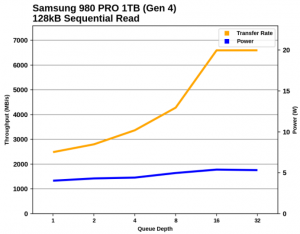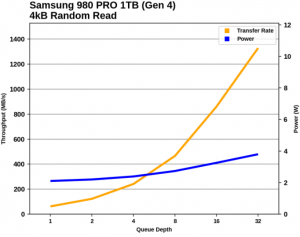Apparently many people are disappointed by the reduce write endurance. That doesn't affect me.
I just want to know from a speed perspective, are those gains actually achievable in real world apps?
I've studied the benchmarks on Anandtech, and the most disappointing thing is the sequential read speed of 7000 MiB/s is only attained at queue depths > = 16. At QDs 1 to 4, there's hardly any improvement over PCIe 3 drives like the SK Hynix Gold P31, which beats the 980 PRO in many categories.

Do games that do upfront loading or any consumer apps take advantage of that parallelism? What about games that continuously stream like Rage or GTA?
For random reads/writes, they claim 1M IOPs vs 500k for the 970 PRO, but the benchmark doesn't show it, at least for QD=32. Only 345K.

It also made me realize how much faster Optane is, especially at low queue depths. Intel is releasing Optane 2 hybrid SSDs soon. Is that a better alternative? I hope they pair the Optane with TLC NAND, not that terrible QLC. Also hope the Optane size is much > 32GiB of Gen1, which was a huge disappointment. The 980 Pro has a whopping ~114 GiB of SLC!
I just want to know from a speed perspective, are those gains actually achievable in real world apps?
I've studied the benchmarks on Anandtech, and the most disappointing thing is the sequential read speed of 7000 MiB/s is only attained at queue depths > = 16. At QDs 1 to 4, there's hardly any improvement over PCIe 3 drives like the SK Hynix Gold P31, which beats the 980 PRO in many categories.

Do games that do upfront loading or any consumer apps take advantage of that parallelism? What about games that continuously stream like Rage or GTA?
For random reads/writes, they claim 1M IOPs vs 500k for the 970 PRO, but the benchmark doesn't show it, at least for QD=32. Only 345K.

It also made me realize how much faster Optane is, especially at low queue depths. Intel is releasing Optane 2 hybrid SSDs soon. Is that a better alternative? I hope they pair the Optane with TLC NAND, not that terrible QLC. Also hope the Optane size is much > 32GiB of Gen1, which was a huge disappointment. The 980 Pro has a whopping ~114 GiB of SLC!
Last edited:
![[H]ard|Forum](/styles/hardforum/xenforo/logo_dark.png)